|
| Author |
Message |
    
miro
Senior Member
Username: miro
Post Number: 233
Registered: 11-2001

| | Posted on Thursday, July 13, 2006 - 02:29 pm: | 




|
Most of us have heard of the Kitchen rudder, but I hve never seen one , until last weekend.
Here are a couple of pctures of the rudder.
I saw the boat being manouevered quite ably, although it seems that there is a learning curve for these things - you need to steer, manage the throttle, and manage the clmm shell positions. When you are under way, the clams are open. In the pictures, the clams are almost shut which provides a reverse thrust which can be directed to port or s'bord.
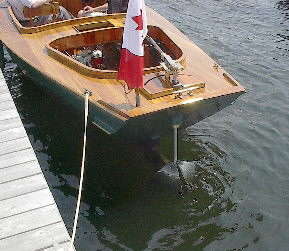
The boat is powered by a 1 cylinder St Lawrence
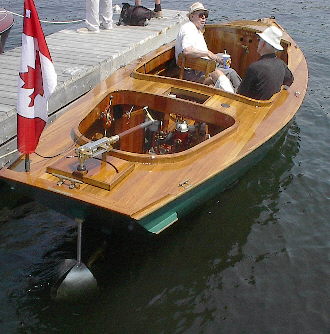
JB, John S and Dick G (in LA) - maybe you folks might want to consider using these rudders on the swamp river boats. I sent you some info via surface mail - should be there in a week or so.
miro |
    
solarrog
Senior Member
Username: solarrog
Post Number: 158
Registered: 03-2002

| | Posted on Thursday, July 13, 2006 - 02:40 pm: | 




|
That is one beautiful boat
Rog |
    
rbprice
Senior Member
Username: rbprice
Post Number: 211
Registered: 11-2001

| | Posted on Friday, July 14, 2006 - 09:22 pm: | 




|
So Forest - you saved the best stuff for after we had left eh?
I gather this was at the Gravenhurst show on Saturday?
Thanks again for a wonderful four days.
Bob |
    
barry
New member
Username: barry
Post Number: 2
Registered: 02-2006
| | Posted on Saturday, July 15, 2006 - 11:05 am: | 




|
Miro,
Thanks for posting about my Kitchen rudder. I was busy all day at the Gravenhurst show with explanations and demonstrations... would have enjoyed taking you for a ride and had you try it first hand. I'll contact you next time I'm in the Lake Rosseau or Muskoka area. If others would like to try it, please let me know.
A Kitchen Rudder provides exceptional maneuverability even better than twin screws, very fast stopping, right angle turning, very slow speed, reverse, stern thrust, etc?. all accomplished without changing engine RPM, direction or engine load. It's very surprising to me that mine is the only Kitchen rudder regularly used.
Here some more images and explanation about the construction and operation of this Kitchen rudder, also two images of the St Lawrence engine that powers my little launch. The engine develops 2.5 HP at 850 RPM and moves the 1500 lb boat at hull speed.
When I built the Kitchen rudder, I first prepared a complete set of detailed engineering drawings. These can be used to build a rudder using basic machine shop equipment, the only fancey machining is the acme thread and nut. If anyone is interested in using these drawings, please contact me by email.
Barry Millar
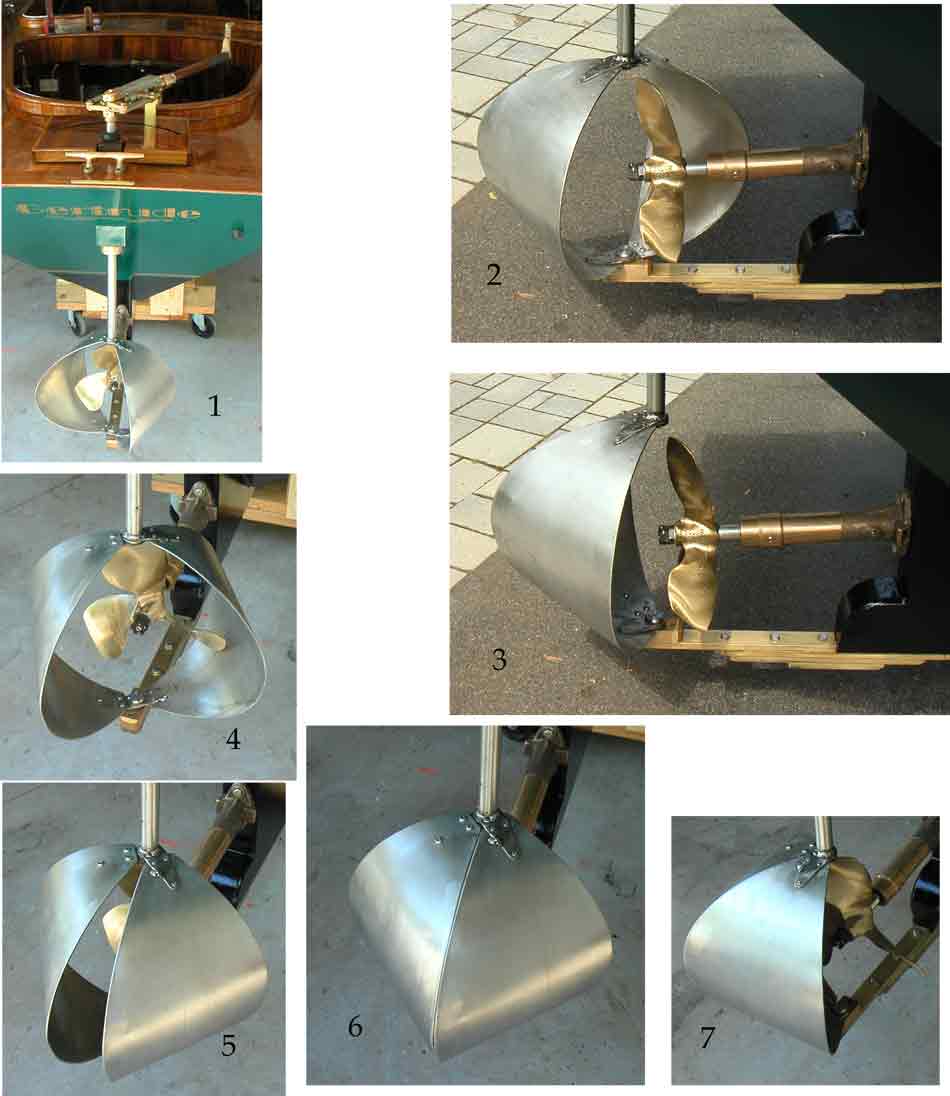 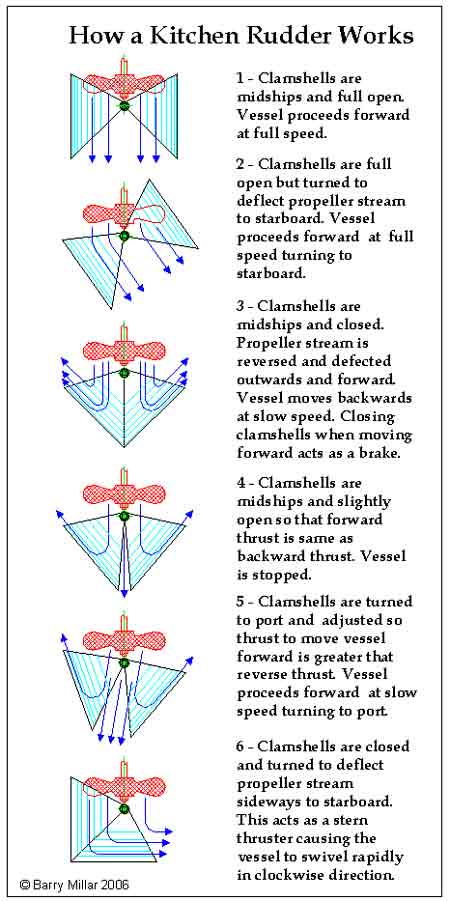 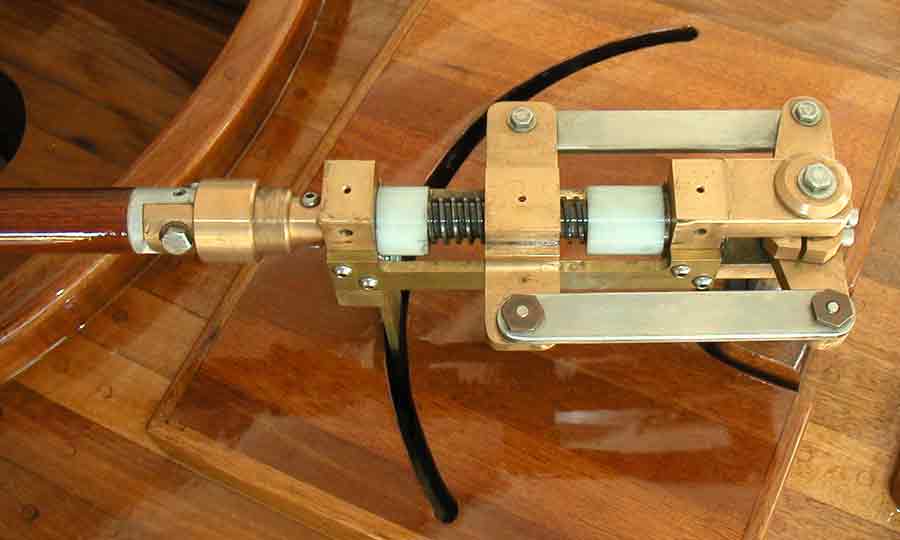 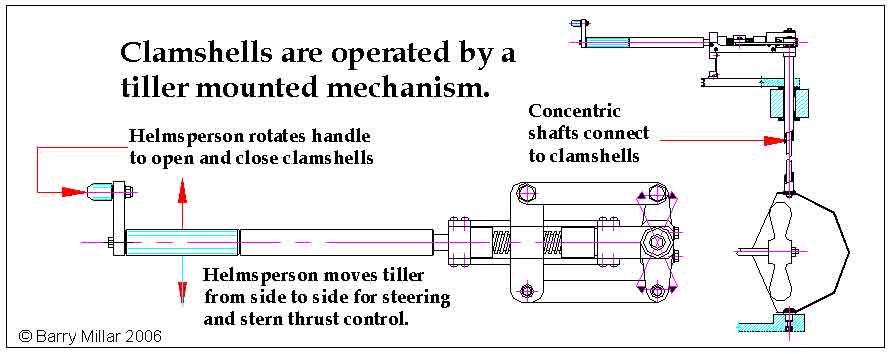 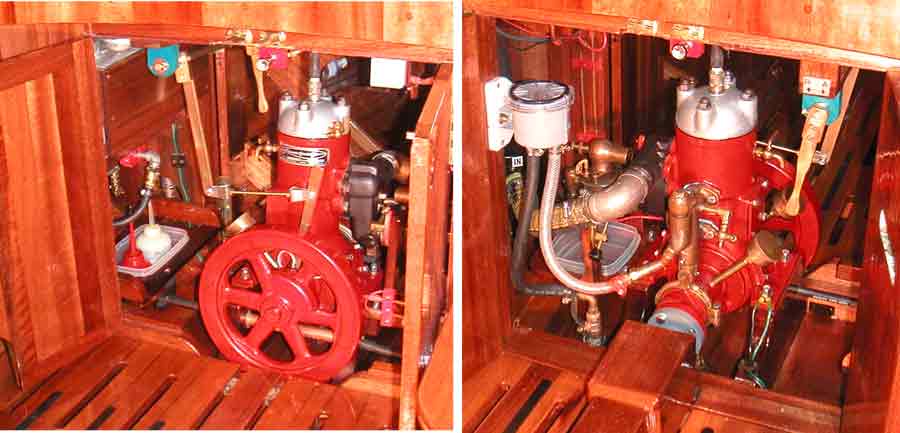 |
    
rbprice
Senior Member
Username: rbprice
Post Number: 212
Registered: 11-2001

| | Posted on Monday, July 17, 2006 - 07:29 pm: | 




|
Fantabulous picturers and expanations Barry.
Did you build the rudder and its controls yourself or are they restored from another boat>
Thanks very much.
Bob |
    
jb_castagnos
Senior Member
Username: jb_castagnos
Post Number: 153
Registered: 07-2002
| | Posted on Monday, July 17, 2006 - 10:05 pm: | 




|
Great job on the rudder Barry, thanks for posting it Miro. Dickie Gibbens told me about these when I first started the hobby, he had an idea to use one, don't remember what boat he wanted to try it on. It seemed like a good idea when he explained it, Barry's drawings make it look even better. |
    
barry
New member
Username: barry
Post Number: 3
Registered: 02-2006
| | Posted on Tuesday, July 18, 2006 - 02:05 pm: | 




|
In 1950, when was a 18 years old, my father purchased a new two cycle engine from the St Lawrence Engine Company located in Brockville, Canada, for use as auxiliary power for a 24 ft sloop that we built the previous winter in our backyard workshop. This was probably one of the last two cycle one-lunger built by St Lawrence. I acquired this engine about 1963 and placed it under my work bench with a nostalgic plan to someday build a small launch and power her with this engine. Images of this engine are included in my July 15 post. (I don?t know the reason the images in this post are stacked horizontally rather than vertically. I realize it is a bit awkward to view the information. Next time I will size the images at about 600 pixels wide. Maybe they will then view vertically)
Finally in 2002 I built Gertrude, the vessel pictured in Miro's July 13 post. Originally a conventional rudder was fitted. Since the engine is direct connected to the propeller without transmission or clutch, starting, docking and maneuvering was an exciting experience that resulted in several close calls, near collisions and groundings. I became proficient using a paddle and judging the exact moment to cut the engine as to allow coasting to attempt dockside arrival, to the entertainment of the usual concerned audience.
I knew of Admiral Kitchen's reversing rudder having read about it in Weston Farmer's classic book From my old Boat Shop. So I called upon my years of Industrial experience in the machinery design/build business and prepared a complete set of engineering drawings for a Kitchen rudder that could be built using basic machine tools. I arranged for a friend who had a lathe and milling machine in his garage to machine the details using my drawings. The clamshells were cut from flat stainless steel sheet using a full size paper pattern then rolled to the semi circular shapes by a local shop. The result is illustrated by the images and line drawings attached to my July 15 post.
I am thrilled with the result. Now I am able to maneuver my boat much better than possible with a conventional transmission and in my opinion better than a vessel equipped with twin screws. Dockside engine starting is now standard procedure. Maneuvering in a busy narrow waterway is easy and predictable without engine adjustment. I am able to sit without motion, back up, creep at slow speed, turn on the spot etc. My favorite docking procedure, particularly when there is an audience present, is to drive forward at an open slip, then rapidly close the clam shells and at the same time move the tiller about 20 degrees to starboard. Gertrude comes to an abrupt stop, swivels 180 degrees clockwise, as the Kitchen rudder also functions as a stern thruster, so her stern is then aligned with the open slip. I next move the tiller amidships and back in and when tied to the dock stop the engine.
John Kitchen, a British Admiral invented and patented his rudder in 1914. Open cutters fitted with Kitchen gear were apparently fitted to all British naval vessels of cruiser size and larger, presumably to provide superior maneuverability. Several cutters were acquired by and used by the Canadian and Australian navy during WW2. One cutter with Kitchen gear is undergoing restoration at Goolwa South Australia.
http://www.woodenboatfestival.com.au/pdfs/wooden-boat-newsletter-dec04.pdf
I am aware of a Kitchen rudder fitted to a training vessel located at Belfast Ireland. To my knowledge mine is the only one in the world that is newly constructed and sees regular use with a two cycle engine powered open vessel. Other than for general interest, I am providing this information via this post to determine whether there are other like minded individuals who may wish to build and use a kitchen rudder as I am very interested in promoting this by making available a drawing/ how to build a Kitchen rudder package at a reasonable price.
I have already received an expression of interest from Julian Dubois and Gary Edwards in Australia. It seems to me that other collectors and users of old marine engines may be interested as well so I will get back to you Gary and Julian in a week or so.
Am attaching a composite image.
Top illustrates vessel preceding in reverse
Middle shows vessel rotating ( note water pattern) as described above to align with slip prior to backing into slip
Bottom shows vessel tied to dock, propeller rotating, no vessel motion.
Barry Millar, July 18 2006
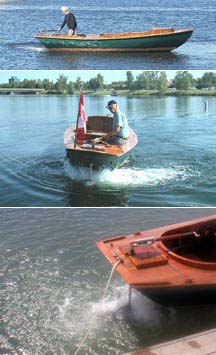 |
    
richarddurgee
Senior Member
Username: richarddurgee
Post Number: 1177
Registered: 11-2001

| | Posted on Tuesday, July 18, 2006 - 10:05 pm: | 




|
I have come across several ads for the Kitchen Rudder system, but until I put the name McNab-Kitchen together I couldn't access them !
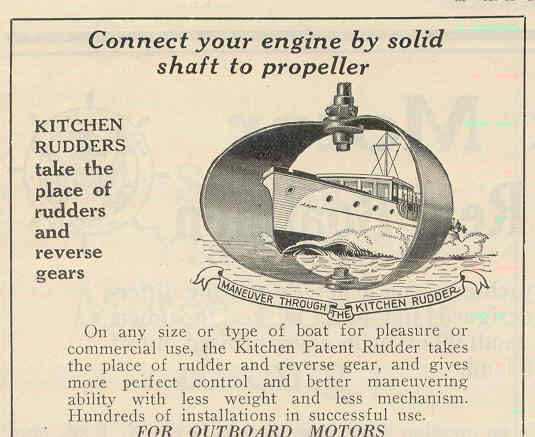
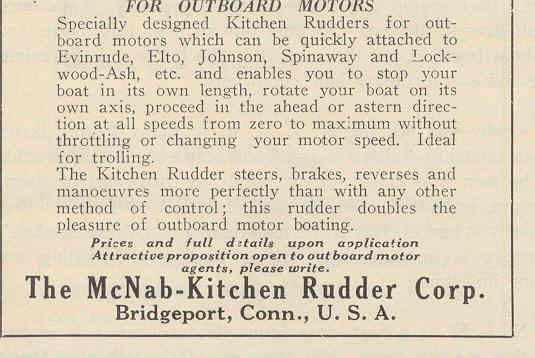 |
    
Jim McClain
Visitor
| | Posted on Thursday, November 03, 2011 - 03:51 pm: | 




|
Barry. I would be very interested in purchasing a set of drawings if you make them available,
Thanks Jim
Great job! |
    
bcm
Member
Username: bcm
Post Number: 28
Registered: 11-2009
| | Posted on Thursday, November 03, 2011 - 07:59 pm: | 




|
Jim,
Please post images of your boat and let me know why you wish to install a Kitchen Rudder. I will also need details about your engine.
I’ll then provide an opinion about using a Kitchen Rudder.
Also … where are you located.
Barry Millar |
    
russell
Senior Member
Username: russell
Post Number: 55
Registered: 08-2003

| | Posted on Saturday, November 05, 2011 - 01:52 am: | 




|
I remember when I was a teenager that the RNZN had a clinker cutter (I guess off one of the older ships) with a kitchen rudder that was used for general duties on Auckland harbour. She periodically ran liberty men from the naval base to the Admiralty steps right opposite my father's office downtown. I too was amazed to see how manoeverable that boat was. The clamshells (as you aptly call them) were actuated by a hand wheel on the end of the tiller and the steering was done hanging on to a a kinked arm above. There is a picture of the unit in one of the RN training manuals -can scan if you want it. All made from good bronze castings of course. |
|
|
|


|


